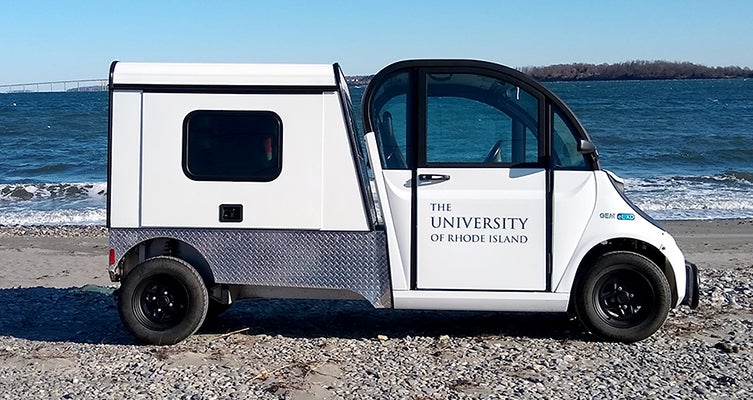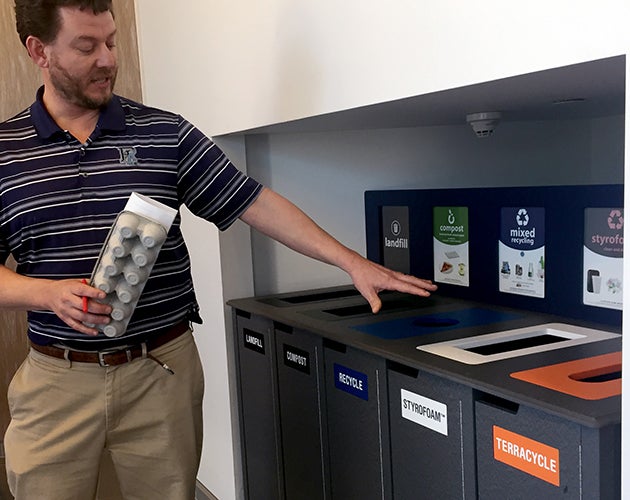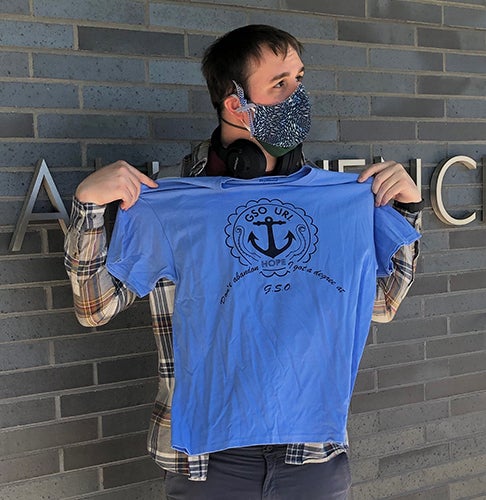Aboard GSO, Fall 2020

2020
![]()
The first 100% electric vehicle is acquired for use by GSO Maintenance. Street legal and classified as a low-speed vehicle (LSV), it can be charged on a standard household outlet and has a range of up to 60 miles per charge. The LSV’s top speed is 25 m.p.h. It can carry or tow more than 1,200 pounds. The LSV operates at one tenth the per-mile cost of a traditional truck, improves environmental sustainability for the campus, and reduces GSO’s carbon footprint.
![]()
The Ocean Sciences Meeting 2020—co-sponsored by the American Geophysical Union, the Association for the Sciences of Limnology and Oceanography and the Oceanography Society—was held in San Diego. GSO faculty, students and staff give more than 80 presentations during this week-long gathering of the ocean-sciences and the larger ocean-connected community. A reception for GSO friends and affiliates, including area alumni, was hosted by Associate Dean David Smith.
![]()
GSO’s Environmental Sustainability Committee deploys a pilot effort to gauge the community’s use of and interest in advanced recycling and upcycling systems. Separate bins are installed in Nautilus Galley for general recycling, styrofoam, batteries, and TerraCycle (foil lined wrappers, plastic film, coffee capsules, disposable cutlery, textiles, electronic waste, office supplies) and composting. The center is part of a community effort to make the campus more environmentally sustainable. Members of Chowder and Marching Society and the committee are directing collected materials to various recycling destinations.
Due to the Covid-19 pandemic, all URI classes go online and staff and faculty begin working remotely. Effective delivery of the curriculum via online classes for the remainder of the Spring semester is devised on one week’s notice. Research operations are stopped or greatly reduced. The campus remains open and essential services, including maintenance and custodial work, are maintained.
![]()
R/V Endeavor returns to the Narragansett Bay Campus with no cases of Covid-19 on board. News coverage includes observations from professor Rainer Lohmann, while an online “Welcome Home” event fields viewers’ questions about the science mission. Endeavor remains at her pier with a skeleton crew and support staff.
The Program Advisory Committee of the East Coast Oceanographic Consortium holds its inaugural meeting. Representatives from GSO, Woods Hole Oceanographic Institution (WHOI) and the University of New Hampshire (UNH) attend. Joel Llopiz of UNH is elected to a three-year term as committee chair.
![]()
The year’s degree recipients (listed below with their academic advisors in parentheses) are honored at a virtual ceremony:
Master of Oceanography
Shannon McCarthy (Smith)
Sarah Shapiro (Smith)
Nicholas Celico (Smith)
Skyler Jordan (Smith)
Master of Science
Megan Lubetkin (Kelley)
Christine Gardiner (Lohmann)
Victoria Fulfer (D’Hondt)
Alexis Johnson (Omand)
Doctor of Philosophy
Christopher Orphanides (Collie)
Rebecca Stevick (Gomez-Chiarri/ Post)
Kira Homola (Spivack)
Colin Jones (Robinson)
Advancing Reach Through Telepresence Technologies, produced by the Inner Space Center, won a “Presenter’s Choice” award in the 2020 National Science Foundation STEM for All Video showcase. Presenters of the 170+ projects submitted voted for videos they felt were most creative in using video media to showcase innovative STEM initiatives.
R.I. Sea Grant Director Dennis Nixon receives an honorary doctorate from Roger Williams University School of Law. Nixon, who is retiring this year, has served as Director of the R.I. Sea Grant Program since 2013. He has led a research and education program devoted to using science to improve management of R.I.’s coastal waters. Dennis notes particular pride in the thousands of his former students now working in marine industries, government, law and science.
The Coastal Resources Center and several partners host the first of four webinars that is attended by more than 230 people from 44 countries. The summit—“Global Ocean Series: Linking Large Marine Ecosystems to Local Science and Management for Sustainable Development”— focuses on how scaling between local management and large marine ecosystems connects to the U.N. Decade on Ocean Sciences for Sustainable Development.
![]()
R.I. PBS and GSO’s Inner Space Center launch an immersive digital series for students and educators. “Ocean Exploration” pairs extraordinary deep-sea footage, provided by Ocean Exploration Trust, with creative lesson modules.
As part of the the #ShutDownSTEM initiative, the campus community engages in online discussions about racism, social justice and outreach. Volunteers facilitate topics on inequality in coastal resources management, effective allyship, white fragility and privilege, increasing public engagement, and funding to improve diversity. Participants frankly address tough issues and resolve to examine what it means to be born into privilege, how systemic racism and exclusivity exists in STEM, and what actions can be taken at GSO to construct and sustain an environment of inclusivity and allyship.
![]()
The SURFO (Summer Under-graduate Research Fellowship in Oceanography) Program adopts an online format. Students make their presentations from off campus.
Water-quality monitoring at South Ferry Road beach begins, providing long-absent testing services for human health concerns posed by fecal coliform and enterococci bacteria. Samples are collected every two weeks through October for analysis by URI’s Watershed Watch Program.
![]()
Bruce Corliss completes his eight-year tenure as the fifth dean of GSO. Associate Dean David Smith serves in the interim, until arrival of the school’s sixth dean, Paula Bontempi.





